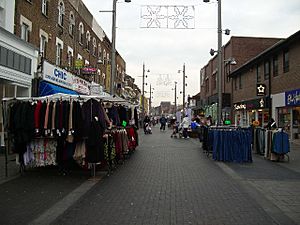Walthamstow Market facts for kids

The market runs along the pedestrianised high street
|
|
| Location | Walthamstow, Waltham Forest, Greater London |
|---|---|
| Coordinates | 51°34′59″N 0°01′37″W / 51.583°N 0.027°W |
| Address | High Street |
| Opening date | 1885 |
| Management | Waltham Forest London Borough Council |
| Owner | Waltham Forest London Borough Council |
| Environment | Outdoor |
| Goods sold | General goods, food, clothes |
| Days normally open | Tuesday–Saturday |
| Number of tenants | Approximately 100 |
Walthamstow Market is a super long outdoor market located in Walthamstow, a part of London. It's known for being the longest outdoor market in Europe! Even though some people say it's a mile long, it's actually about one kilometer. You can find it stretching along most of Walthamstow's High Street.
Contents
Discovering Walthamstow Market
The market is in the London Borough of Waltham Forest. It's a really important place for the local community. The market is open five days a week, from Tuesday to Saturday.
A Look at the Market's History
The street where the market is now, called High Street, used to be a quiet country lane named Marsh Street. But in the 1800s, it grew a lot! The market itself started way back in 1885. Today, this High Street is the heart of Walthamstow. You'll find the main train and tube station, bus station, post office, and library all nearby.
What Happens on Market Days?
From Tuesday to Saturday, Walthamstow Market takes over the High Street. Saturdays are especially busy and exciting! There's even a special French market sometimes in the Town Square, right next to the main market. On Sundays, the street is much quieter. Some shops and cafes are open, and there's a farmers market in the Town Square in the morning.
The street market runs almost the whole length of the High Street. It has about 500 stalls! Along the street, you'll see all kinds of shops. There are small, traditional shops and also big supermarkets. The smaller streets nearby are mostly filled with houses.
People and Cultures at the Market
The High Street area is home to many different people from all over the world. About 41% of the people living in this area are from black or minority ethnic backgrounds. Many are from Pakistan and the Caribbean.
The market has a traditional "cockney" feel, which is a classic London style. But it also has lots of new influences from all the different cultures living there. It's a lively and interesting place to visit!
Shopping at Walthamstow Market
You'll find a mix of big stores and unique local shops here.
Big Stores You Might Know
There are two main areas with newer buildings that are different from the older market style:
- Sainsbury's supermarket: This is a large grocery store. It's part of a bigger building that also has a few other shops. Above Sainsbury's, there's a two-story car park. You can take a lift from the car park right down to the supermarket.
- The Mall Selborne Walk: This is a much bigger shopping center. It has shops facing the High Street and also an indoor shopping mall. Many of the shops inside are big chain stores, like the Asda supermarket. There's a road called Selborne Road that runs next to the High Street. This road is used for cars and buses to get to The Mall.
Cool Independent Shops
Walthamstow Market is also home to many small, independent shops. These shops often specialize in foods from different countries, like Polish, Russian, Indian, Chinese, and Caribbean foods. You can also find Halal and English butchers, fabric shops, and stores selling things for your home.
There are lots of cafes too! You can try English, Indian, Turkish, Portuguese, and Chinese food. There's only one traditional pub, called The Chequers.
One special place is L. Manze, a pie and mash shop. It opened in 1929 and still serves traditional meat pies with "liquor" (a green parsley sauce), mashed potatoes, and jellied eels. It's a taste of old London!
How the Market is Managed
The London Borough of Waltham Forest is in charge of running and managing Walthamstow Market. They make sure everything runs smoothly.
Getting to Walthamstow Market
It's easy to get to the market using public transport!
| London Buses | Walthamstow Bus Station 20, 34, 55, 58, 69, 97, 212, 215, 230, 257, 275, 357, W11, W12, W15, W19 St James Street Station 158, 230, W12 |
| London Underground | Walthamstow Central |
| London Overground | St James Street, Walthamstow Central |
 | Kyle Baker |
 | Joseph Yoakum |
 | Laura Wheeler Waring |
 | Henry Ossawa Tanner |

